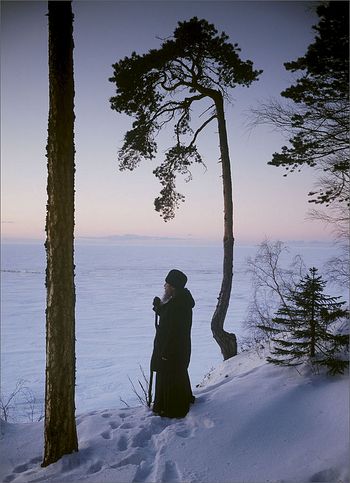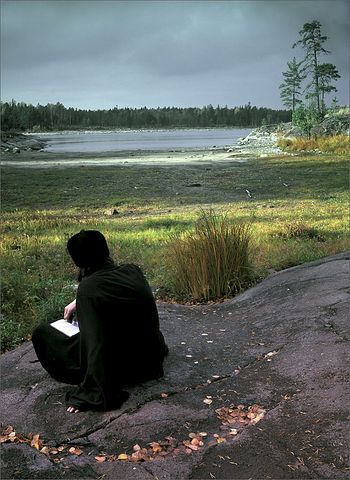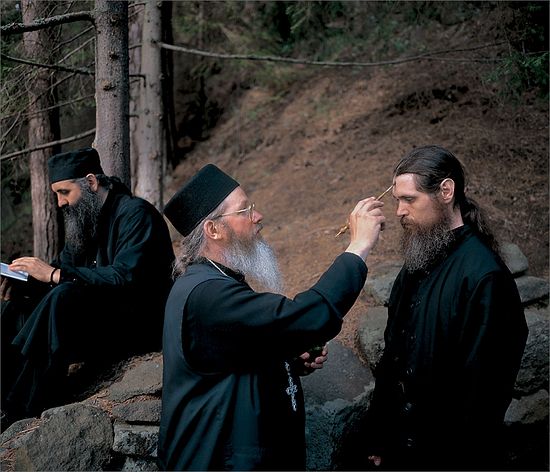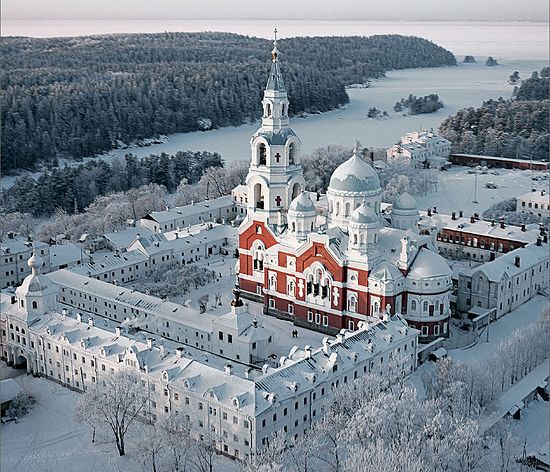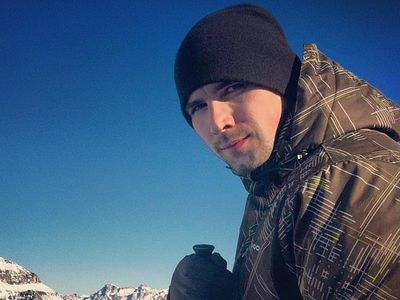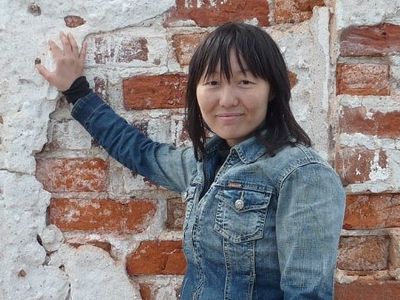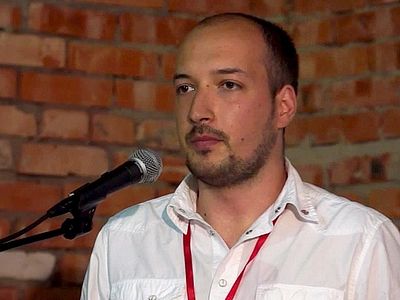Jeremiah McKemy is an American convert to Orthodoxy from non-denominational churches, who has begun a blog to share with others his own journey. Here is his story:
My journey into Orthodoxy was not easy. But it is not meant to be easy. It challenged me (and continues to do so) to become the person God has created me to be, and to recognize my place in His Body, the Church.
When one becomes Orthodox he or she is called a “convert,” which helps to emphasize just how much of a change one must experience. Becoming Orthodox is not simply acknowledging one belief system as being superior to another. It is an ontological change, meaning it regards your entire being.
In order for the conversion process to be authentic, one must encounter this mystical body of Christ and not ask, “What do I like about this that I can choose from?” Rather, we must allow ourselves to be shattered upon the Rock and rebirthed into a Son of the most-high God.
My journey:
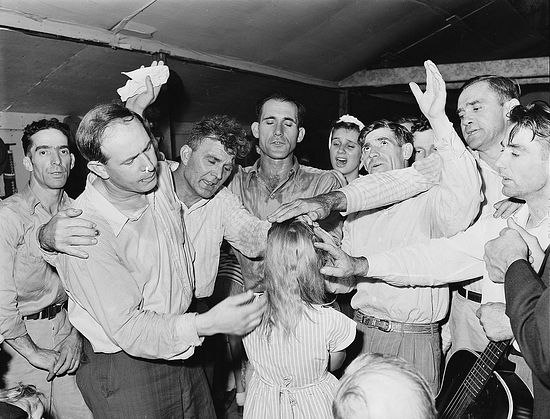 Healing “laying on of hands ceremony in the Pentecostal Church of God. Lejunior, Harlan County, Kentucky.
Healing “laying on of hands ceremony in the Pentecostal Church of God. Lejunior, Harlan County, Kentucky.
I was raised in a conservative Christian home that leaned toward the charismatic, tongue speaking side. I attended non-denominational churches throughout most of my youth and student years. I enjoyed that type of worship for several years and stuck with it through college because it seemed alive and not full of “dead traditions.”
After college though, I became disillusioned with the modern American church scene, which often seemed to contain more hype and emotion than an authentic and life-changing presence of the Holy Spirit. I began to dialogue with other Christians as well as atheists through a blog network. These dialogues forced me to consider points of view I never knew existed. Consequently, I adopted the view that “everybody has it wrong and I don’t know what to think church is supposed to look like anymore.” My wife and I dropped out of church for a couple of years and I committed my time to studying the Bible and Church history.
Eventually, I connected with a few churches in my area but couldn’t fully commit to one. I thought of that as a virtuous sort of thing, because hey, none of them had it fully right anyway. At least in this manner, I could cherry pick the things I liked.
I was a worship leader for years and, it seemed, no matter where I went I ended up assisting with or leading their music. I found minimal fulfillment in leading worship. It was exciting while doing it, but the warm feelings were temporal. When I left the parking lot of the church or outreach ministry, I felt the return of a nagging restlessness and emptiness.
The Restless Emptiness
What to do with these unpleasant feelings? Being the typical American Christian, the answer to me seemed obvious: become more busy with “serving God.” I hung out with the homeless one day of the week, reached out to the unchurched another day, went to a Bible study on another day, was involved in prison outreach, Sunday morning worship, etc. During a period in which I was jobless, I was involved with various spiritual communities almost every day of the week.
While a desire to be involved and serve God is admirable, I knew there was something missing. No matter how involved I was, the warm fuzzies of the event would fade away and I was left with my restlessness, emptiness, and even loneliness at times. I attempted to manage my sin the best I could, but it had the upper hand. I was a slave to my sinful desires and I exhibited self-destructive behavior that hurt both myself and others.
Something had to change.
What is this Orthodoxy?
I tried the charismatic movement, I ran in progressive Christian circles, I looked back at my roots of conservative Christianity, and I even considered starting my own home church. Nothing had a satisfactory answer.
A spiritual mentor of mine suggested I look into Eastern Orthodoxy (he himself was not Orthodox but had friends who were). I gave him a dismissing waive, telling him I had read about them in my history books, “They’re nothing more than the Roman Catholic Church of the East.” He told me there was much more to it than that; there was a hidden depth and treasure of spiritual knowledge within Orthodoxy. I highly respected his opinion and tucked that conversation away to chew on later.
My spiritual journey continued as I outlined above: full of busyness and emptiness. But I found something odd: I kept “bumping into” Orthodox Christians in my online discussions as well as their theology in some of my readings. Every time I had a differing opinion with them, I found that I agreed more with the Orthodox Church than I did with myself. After a year or so, I sighed and decided it was time to take the advice of my spiritual mentor seriously.
As with many inquirers, I began with Kallistos Ware’s The Orthodox Church and The Orthodox Way. They were good primer books that helped me to understand some of the beliefs and practices of the Orthodox Church. After reading most of the way through those books and having several discussions with Orthodox bloggers, I decided the only thing left was to make an actual visit to an Orthodox Church.
For several months I wanted to attend an Orthodox Church, but I was afraid of letting people down. Eventually, I decided I would not be controlled by my fear of people’s opinions and I would go where I felt God was leading me. This was an important step for me.
I had a difficult discussion with the man who was at that time my pastor. While not everyone would need to talk to their pastor about leaving their church, I was part of the Sunday morning worship team and, on some Sundays, the primary leader. The pastor was disappointed to see me leave, and I felt a bit guilty for letting him down. I told him it might only be for a month or two. I had no idea what God had planned for me.
Entering a Foreign Land
My wife agreed to venture out with me for our first liturgical experience: a visit to the local Greek Orthodox Church.
We were completely lost.
About half of the service was in Greek; they were swinging incense around; many people were coming in an hour late (we were one of the first ones there and were only a couple minutes early); people were standing and sitting over and over; there was a random procession where the priest walked out with some shiny dishes in his hands and everyone became solemn (the Great Entrance); there were conversations around us in Greek (nearly everyone there was Greek); and we hadn’t a clue what was happening. With all of this chanting and singing, I wondered when they would begin the actual service. There was a sermon at one point that, while brief, struck my heart and I longed to hear more.
After standing (and some sitting) for two hours they began a memorial service and I looked at my wife and whispered, “You ready to go?” She nodded emphatically and the two of us quickly walked out just as people were going up front to receive a piece of bread.
What just happened in there? We both wondered and asked aloud once in the car. Trying to be positive, I said, “That was an interesting cultural experience.”
Soon afterward, we decided to check out a Russian Orthodox parish that was a little further away. As we walked in and looked around in our usual clueless manner, the elderly priest walked up to us with a smile and explained that they were going to be doing their first service ever partially in Slavonic. We nodded and said, “Ok, thanks for letting us know” as I thought, “Slav…what?”[1] There was something deep and loving about that priest, and even though we were bored with the liturgy, I felt a tug in my heart to return.
By then, my wife was finished with experimenting in Orthodoxy, though she did not oppose my continued exploration. I frankly couldn’t blame her. And if it wasn’t for an incredibly powerful and irresistible tug in my heart toward it, I would have given up on Orthodoxy as well.
Growing up in charismatic circles, I had grown used to live bands, words on large projector screens, kickin’ music, and an entertaining and sometimes emotional sermon that took up most of the service time. It was the Sunday Morning Show.
To me church was supposed to loosely follow this format:
Opening song
Announcements
Three or four more songs
Sermon (which took up a majority of the service time)
Altar call
Closing song
Every time I visited the Orthodox Church, I found that I was waiting for the service to actually begin. It was then that I realized that my subconscious impression was that Sunday morning services are a sermon with an opening act. Ironic thinking, considering I was a worship leader for years.
Digging Deeper
One day, I heard that there was another Orthodox Church much closer to my home. I visited the all-English Carpatho-Russian parish and found the people to be quite inviting. After a couple of chats with the priest, he recommended a book to me called Introducing the Orthodox Church in order to help acquaint me with the service, the theology, and the church building itself.
I was repeatedly challenged in Orthodoxy: So many of the concepts were foreign to an American and charismatic Christian like me. Many of my struggles included the role of Mary the Theotokos, praying with the saints, a service that was not open to changes on a whim, submission to hierarchy, the exclusive claims of Orthodoxy as being the Church, and—as strange as it may sound—the repeated requests for God’s mercy. Aren’t we all already saved, I thought. Why keep asking for God’s mercy?
But there were many aspects of it that I found to be refreshing: Once I was used to a different style of worship, I realized there was a deep beauty to it. In the Orthodox Church there was no rock star worship leader or superstar pastor who took it upon himself to be the center of Sunday morning. Instead, I found that the Eucharist was celebrated as the actual body and blood of Christ made present among us, and that was the center of attention—Christ’s (invisible) presence in our midst. And it wasn’t even talked about so much as it was acknowledged through experiencing the service.
With that being the case, it was very unpretentious. Sure there are clergy with fancy vestments, incense, and bells. But no Sunday morning rock concert, no motivational speech, no hype, and no warm fuzzies. You were expected to simply show up with a ready heart and meet God there.
I also realized the altar call (which began during the revivalist movement) was absent from the typical Sunday morning service (called the Divine Liturgy). That really bothers some people. How can we get people saved without an altar call? Of course, in order to answer that, we should pose a better question: what does it mean to be saved?
In Orthodoxy, salvation is not an event that happens to someone (i.e. a prayer and a mental ascent to a particular doctrine) so that one can escape hell and go to heaven later. Rather, it is a complete change of heart and being in which one’s entire self must be crucified with Christ and resurrected in Him so that they can intimately become one with Him in this life and the next. With some exceptions (such as the thief on the cross next to Christ), that process of change is a lengthy one.
THE TRUE EARLY CHURCH
After arriving at the Carpatho-Russian parish, I spent a few months waffling. Part of me was ready to give up on the boring liturgical services and go back to something with a bit more hype and excitement. I was having difficulty engaging in the services. Also, some of the above mentioned theology was challenging.
So, I spent months studying the writings of the ancient church within its first 120 years after Christ’s death and resurrection. Many Protestants have a desire to return to the “early church;” quite a few (myself included at that time) think the Church became completely pagan by the time of Constantine.
But my studies blew away all of my assumptions regarding what the early church looked like. (You can read some of those writings here, they are called the Apostolic Fathers.) I had to confess that most everything I was learning was contrary to my modern imaginings of the early church.
There were bishops whom one was required to submit to if one wanted to be a Christian; the Eucharist (communion) was considered the actual body and blood of Christ; services were liturgical in nature; only baptized believers were allowed to stay until the end of the service when the Eucharist was served; there was no mention of instruments being used in worship; there were required periods of fasting; and many other things.
As my historical research progressed, I could not help but admit, somewhat unwillingly, that the Orthodox Church is the early Church they were claiming to be. However, that is not what convinced me to join. After all, what good is the claim to an outward structure and worship format if there is no life within?
Losing Interest
After months of what felt like dry liturgical services, my quasi-Pentecostal mindset wondered: where is the Holy Spirit in all of this? I recognized the validity the Orthodox Church’s claims to have the same beliefs and practices as the early church, but what good is that if the Holy Spirit has abandoned them and their services are dead and boring?
It was then that I somehow came across the book The Way of a Pilgrim. It is the story of a young Russian peasant during the late 1800’s who set out on a quest to experientially understand St Paul’s command to “pray without ceasing.”
The pilgrim learns about the Jesus Prayer (“Lord Jesus Christ, have mercy on me a sinner”) and begins to practice it rigorously. I decided that I would journey with this simple Russian peasant and practice the Jesus Prayer. My priest, who himself was experienced in this prayer life, asked that I meet with him regularly to discuss how things were going with this.
The Divine Spark
Words cannot adequately express what began to happen in my heart as I opened myself to Christ and the Holy Spirit through a disciplined prayer life. When first venturing into Orthodoxy, I began reciting a few simple selections from the Morning Prayers. I was now coupling that with the Jesus Prayer throughout the day, and I began to notice changes in myself.
The prayer is not meant to be a mantra; rather it is something that is fused to our hearts. It opens us to inner communion with Christ. As this deepened, I noticed that old sinful habits that had the upper hand over me for many years were shaken. I was far from overcoming them, but a visible shift had taken place. Even my wife commented that something was happening to me; at that time she did not want to join the Church herself, but she liked what it was doing to me.
After some months had passed, the church services that I once found boring were moving me to tears at times. I sensed a deep presence of Christ in the worship and even in the icons. The power of the Holy Spirit overcame me in a way that was very quiet, yet vivifying and profound. It was something into which God had allowed the briefest glimpses throughout my life. Now, it was happening more frequently and more deeply.
The Point of No Return
I came to the realization that Orthodoxy truly was not offering me a new set of beliefs with old ways of doing things. The offering was oneness with the Body of Christ and the Holy Spirit.
There were still some theological questions and hang-ups, but those seemed less important. I concluded that if this is where I am meeting God Himself, then this is where I belong. If there are differences of belief, then maybe it is me that needs to change and not the ancient Christian Church.
With everything that had happened, I felt like the twelve disciples when Jesus had scandalized the multitude by stating they must eat and drink His body. He didn’t shout, “Hey guys, come back. I was just being metaphorical and stuff.” Rather, He let them go and asked the disciples if they too would leave. Peter spoke for all of us when he said, “To whom shall we go?”
And that is exactly how I felt.
I was convinced that Orthodoxy was Christianity in its truest and most powerful form. At the start of my journey, I briefly studied Buddhism and Taoism (the latter of which I found to be attractive), but everything I liked about those I found to an even fuller extent in Orthodoxy.
Landing Gear is Down — I’m Coming Home
After years of feeling spiritually homeless I knew where I belonged. Keeping with an early tradition of the Church in which many converts were brought in the day before Pascha (Easter), I was chrismated on Holy Saturday and partook of my first Communion on Pascha.
It was a cold, wet morning, but nothing could quench the fire within; I was exploding with life, joy, and love. No longer was I part of the nameless, placeless, faceless tribe! I wanted to embrace the entire world and shout to them about the love of Christ that I found in Orthodoxy. During those initial months, I probably seemed like a fanatic and I wouldn’t be surprised if I annoyed some of my family and old friends.
Settling into Orthodoxy
The coming months and years had many challenges. I continued to discover the life-changing power of God’s grace in the Orthodox Church, but the “old man” does not die easily or quietly. As St. Ignatius Brianchininov said, our flesh does not like to be crucified.
In my Protestant years, we practiced sin management. In other words, “Sin is bad, so try not to do it. And if you do sin, say you’re sorry and move on.” During those years I surrounded myself with noise and distractions so I wouldn’t hear my heart or conscience.
It was not the same in Orthodoxy.
Instead, I was learning inner quietness and that Christian virtue was not simply a nice idea, but the direction in which we should be striving to become one with Christ. The commandments of God were not given to us because God has a quirky dislike for certain things; rather, they reflect who God is. If salvation is oneness with God, and sin is breaking oneness, then, I realized, to break the commandments is to break my communion with God by participating in behavior with my soul and my body that is contrary to the very Being of God.
Heaven and salvation are not a place or an eternal destination. Rather, they are a state of being in which we experience oneness with God Himself. This life prepares us for that oneness, and I began to realize the depth of my selfish desires as the Holy Spirit further enlightened my heart. I learned first hand why the Church is called a hospital for the soul and salvation is considered to be therapeutic (and not an instantaneous magic trick).
Take a Little Time
One of the most important decisions I made on my journey into Orthodoxy was that I would not hurry. After the first month, I realized through the haze of challenges that there was something within me deeply drawn to it. I decided I would purposely take a year to explore it; by then I felt I would know for certain whether or not it was for me.
As I progressed in my journey, I believed that if I waited until I was 100 percent convinced of all beliefs and practices in Orthodoxy, then I may never join. It is completely foreign to our westernized form of Christianity and entering into the life of the Church requires time and grace in acquiring a new heart and mind. I personally feel that if one is mostly convinced and has no major hang-ups, then entering into the grace of the Church will help them resolve any minor lingering thoughts or doubts. Of course, this is my opinion and not pastoral advice.
Positive and Negative Virtues
Once one has joined, he may be a bit overwhelmed—I was. There are cycles of feasts and fasts, a church calendar with daily readings, morning and evening prayers Prayer without ceasing is taught, there are services throughout the week, confession, pre-communion prayers, an expectation to actually live this faith, and all sorts of practices. It is easy to feel frustrated with the spiritual struggle.
As one Greek Orthodox theologian[2] wrote, it is sometimes better to establish the positive virtues before the negative. Positive virtues, meaning those things you add to your life, include establishing a prayer rule, learning the Jesus Prayer, going to church services, spiritual reading, etc. Negative virtues are things that are “taken out” of your life such as sleep (prayer vigils), food (fasting), and other forms of abstinence. These latter virtues, while perhaps being practiced initially in small doses, are strengthened as one’s spiritual life deepens and a desire for them begins. More important than my opinion though is the direction that your spiritual father discerns for your path of salvation.
All virtues have one aim: to attain to union with God (a.k.a., theosis). This is accomplished through the grace of God and humility (the latter of which is our synergistic cooperation with God). Without either of those, the virtues can still be practiced to some degree but will often lead to feelings of spiritual superiority and pride.
Wrapping it Up
In summary, I was spiritually hungry for something deeper than the intellectual Christianity I found in some circles and the hype-based emotionalism I found in others. I wanted an experiential faith filled with wisdom regarding the scriptures and the power of the Holy Spirit. In short, I wanted to encounter God Himself.
Orthodoxy, on the surface, seemed an unlikely candidate. It took some time to realize there was nothing wrong with the liturgical form of worship; rather, I was closed off to the movement of the Spirit. Once that was shown to me through prayer, it was an easier course from there.
If you are considering Orthodoxy, then as I said above, take your time. Read books on it that spark your interest and visit your local Orthodox parish. If you’re not sure what to read, ask your priest and check out a list in my Resources.
Also, online discussion forums were not helpful to me early in my journey. There are really knowledgeable and caring folks in many forums, and there are also some people who enjoy flaunting their opinions or over-zealously attacking anyone who is not well-versed in the fathers. Watching people fight and call each other heretics mostly discouraged me during my initial steps toward Orthodoxy, but I do recognize that some groups have been instrumental in assisting others in their journey.
Finally, approach Orthodoxy in prayer. But also, learn the Orthodox way of praying. My martial arts sensei used to say, “Practice does not make perfect. Perfect practice makes perfect.” In other words, if we learn something wrong and practice it for years that way, we will not suddenly get it right.
It is the same with prayer. The fathers of the Church offer thousands of years of wisdom in regards to prayer, how to pray, what happens in the spiritual realm during prayer, and how to come out victorious. For that reason, one of the first things I would recommend to an inquirer is to glean the wisdom this Church has to offer on prayer. A good Prayer Book can assist with that.
Godspeed on your journey.
